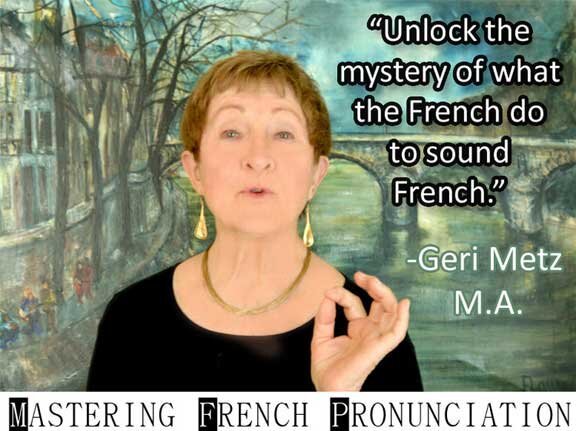La liaison in French is a complex subject, with lists of when liaison is required, when it is forbidden and all the many possibilities when it is optional. (les liaisons obligatoires, les liaisons interdites, and les liaisons facultatives)
Liaison is not technically a subject of pronunciation; it is a subject of when you must make it and when you must not. It is a case of learning (memorizing) all the cases when it is required or not. To simplify the subject, I am proposing here that the student do all the liaisons obligatoires, and for any other possibility, just don't make it. This path will guarantee that you will always be correct. There may be times when a liaison would have been o.k. But if you treat all other cases as “don't make these”you will never be wrong. So, if the case is not listed here, and you question whether to make a liaison or not, the answer is No don't make it; That way you will be guaranteed to not make a mistake in this subject.
Liaison is partly due to the grammatical closeness of the 2 words in question. So an article and its noun, or an adjective and its noun or a subject pronoun and its verb, are closely connected and therefore become a required liaison.
LES LIAISONS OBLIGATOIRES
In noun phrases
--the article plus anything: un_homme; les_amis
Except: in front of an “h aspiré” in which case the liaison is interdite: le//héros; en//haut
--adjective plus noun: mes amis; ton_enfant; les fines_herbes; de bons_élèves
--adjective plus pronoun: deux_autres;
--adjective plus adjective deux_anciens soldats
--between a number and a noun: six cents_éléphants; neuf_heures (here the “f” makes the liaison with the sound “v”;
BUT: no liaison between a number and a word which is not a noun: trois/et trois font six; quatre-vingt/-un; EXCEPT: vingt_et un; vingt_huit; dix_huit; dix_neuf
In verb phrases
--between a reflexive or personal pronoun and a verb, or between a verb and a personal pronoun: ils_ont; ont-ils; je vous_écoute; allez_y; quel temps fait_il?; elle nous_attend
between the pronoun “en” and a verb and between a verb or pronoun and “y” and 'en” : j'en_ai marre; il y en_a six; allez_y; On_y va; je vous_en prie
between tout” and a following word: tout_est possible; tout_à fait; tout_à l'heure; j'ai tout_appris;
between the 3rd person singular and plural forms of the verb “être” and the next word: Note: this category is often placed in the column of “Optional liaisons”, but because of their frequent occurrence in the language the liaison is usually made: c'est_une erreur; il est_avocat; ils sont_allés; la bibliothèque est_ouverte; cela m'est_égal; with other forms of the verbe être liaison is optional, but with “je suis” it is more common to make the liaison: je suis arrivé
between the 3rd person plural of avoir and the next word: this is technically more “optional” than “required” but is frequently used in conversation ils_ont une maison; elles ont _ouvert la boutique
between après and avoir or être in the past infinitive: après_avoir vu; après_être allé
In prepositional phrases
prepositions of one syllable : dans_un an; en_un jour; sans_un sou; chez_eux; des sans_abris;
BUT: no liaison after “vers”, “envers”, and “selon” (see “liaison interdite” blog article)
between one-syllable adverbs and the next word: (très, bien, plus, mieux, fort, moins, trop, tant. très_important; bien_entendu; moins_efficace; plus_utile; rien_à faire; bien_entendu;
The adverb “pas” is technically facultative, but because it is so common, it is very often linked as in “pas_encore” or je ne suis pas_arrivé
between the relative pronoun “dont” and the conjunction “quand” plus next word: l'homme dont_il parle; quand_on le voit; quand_il arrive;
BUT: liaison after the interrogative adverb “quand” is interdite; quand//arrive-t-il?
Except before “est-ce que” : quand_est-ce qu'il arrive? Which is obligatoire as is the common expression “comment_allez-vous
Formes figées: These are expressions that are always said like this:
accent_aigu; les Champs_Elysées; avant_hier; de plus_en plus; de temps_à autre; de temps_à temps; petit_à petit ; pied_à terre; tout_à coup; tout_à fait; tout_à l'heure; vis_a vis; un fait_accompli; plus_ou moins; de moins_en moins; les Jeux_Olympiques; les Etats_Unis, and many more. (note: to use the dash to indicate liaison, the hyphen in the spelling of certain words is automatically eliminated, since the 2 dashes are on the same keyboard key. Such as Champs-Elysées) prêt_à porter avant_hier
Note: In “elocution” or formal speech and oral readings of literature, especially poetry, many more liaisons are used that would be optional or even wrong in conversation. You might hear a newscaster on French TV say “mais_il”, but you wouldn't want to use that liaison in conversation.
To research this article, I consulted 3 different phonetics teachers: Dr. Pierre Delattre, who taught at the Ecole Française of Middlebury College, Vermont; Dr. André Malécot, originally a student of Delattre, who later assumed his positions at Middlebury , the University of Pennsylvania, and the University of California at Santa Barbara and who was my professor and mentor; and the brilliant book of Trudie Booth (French Phonetics) who teaches at the University of Portland. My deep and forever thanks to these pioneers who gave us the foundation of French Phonetics for us to improve our own French accents. Eternal gratitude to all the great ones on whose shoulders we stand.

